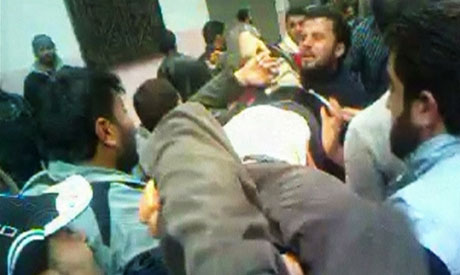
An injured protester is carried by others around him in a location provided as Homs April 22, 2011 in this still image taken from video. Syrian security forces killed almost 90 protesters on Friday, rights activists said, the bloodiest day in a month of escalating pro-democracy demonstrations against the rule of President Bashar al-Assad.
REUTERS
World leaders strongly condemned Syria after its security forces killed more than 80 people during "Good Friday" protests in one of the bloodiest days of a month-long uprising.
The deaths signalled no let-up from President Bashar Al-Assad, whose forces used live ammunition and tear gas against demonstrators in several towns and cities nationwide, witnesses and activists told AFP by telephone.
The bloodshed erupted as thousands of demonstrators took to the streets in order to test long sought-after freedoms one day after Assad scrapped decades of draconian emergency rule.
SANA, the official news agency, claimed that only 10 people died in clashes between protesters and passersby, adding security forces intervened using only tear gas and water cannon.
Rights groups put the toll much higher.
A group called the Committee of Martyrs of 15 March Revolution issued a list of 82 names of people killed, but said the toll could reach 100 as it tried to confirm more deaths from what it called a "massacre."
The London-based Syrian Human Rights Committee put the death toll at 72, while others gave an even higher toll, including a group of activists who said in an Internet statement that 92 people were killed.
Friday's toll compared with killings on 23 March in the southern town of Daraa, a focus of the protests, when activists said 100 people died.
A chorus of international condemnation rang out.
US President Barack Obama blasted Syria's "outrageous" use of violence, accusing Assad's regime of seeking Iran's aid in the brutal crackdown on the pro-democracy movement that erupted in Damascus on 15 March.
"Instead of listening to their own people, President Assad is blaming outsiders while seeking Iranian assistance in repressing Syria's citizens through the same brutal tactics that have been used by his Iranian allies."
The UN chief said Assad's government must "respect international human rights, including the right to freedom of expression and peaceful assembly and called for an independent probe into the killings."
France urged Syria to engage in a "political dialogue without delay," while European Parliament chief Jerzy Buzek called for the release of all prisoners of conscience and British Foreign Secretary William Hague said the killing of demonstrators is "unacceptable."
Amnesty International joined the condemnations with its Middle East and North Africa director Malcolm Smart saying: "The Syrian authorities have again responded to peaceful calls for change with bullets and batons."
The London-based rights watchdog said "at least 75 people have been killed today [Friday] in Syria during mass protests... as the government launched its deadliest crackdown yet on demonstrators calling for political reform."
According to Amnesty, which cited activists, and the martyrs' committee, most of those who perished were killed in the southern town of Ezreh in the governorate of Daraa, the epicentre of the protests launched on 15 March.
More than 20 were killed in and around Damascus, including in the northern suburb of Douma, and Amnesty said at least 18 were killed in the central city of Homs.
Two boys aged seven and 10 were among those killed in Ezreh, Amnesty said.
Thousands of protesters chanting "freedom, freedom," and calling for the fall of the regime swarmed cities across Syria on Friday from Qamishli in the northeast to Daraa, the protest hub, in the south, witnesses said.
There were protests also in the capital Damascus and the northern suburb of Douma, they told AFP.
Assad, in power since replacing his father Hafez as president in 2000, issued decrees Thursday scrapping emergency rule, abolishing the state security court and allowing citizens to hold peaceful demonstrations.
But his detractors said the moves were not enough, and the so-called Syrian Local Coordinating Committees of protesters made a raft of demands, urging a halt to the torture, killings and arrests of protesters.
Friday's protests came after a call by Facebook group The Syrian Revolution 2011 for rallies spanning the Christian and Muslim faiths on "Good Friday," which commemorates Jesus Christ's crucifixion.
Friday is also the Muslim day of rest when the biggest demonstrations have been staged across Syria after weekly prayers.
Before Friday, security forces and plain-clothes police had killed about 220 people in a brutal crackdown on the protests, according to Amnesty International.
Short link: